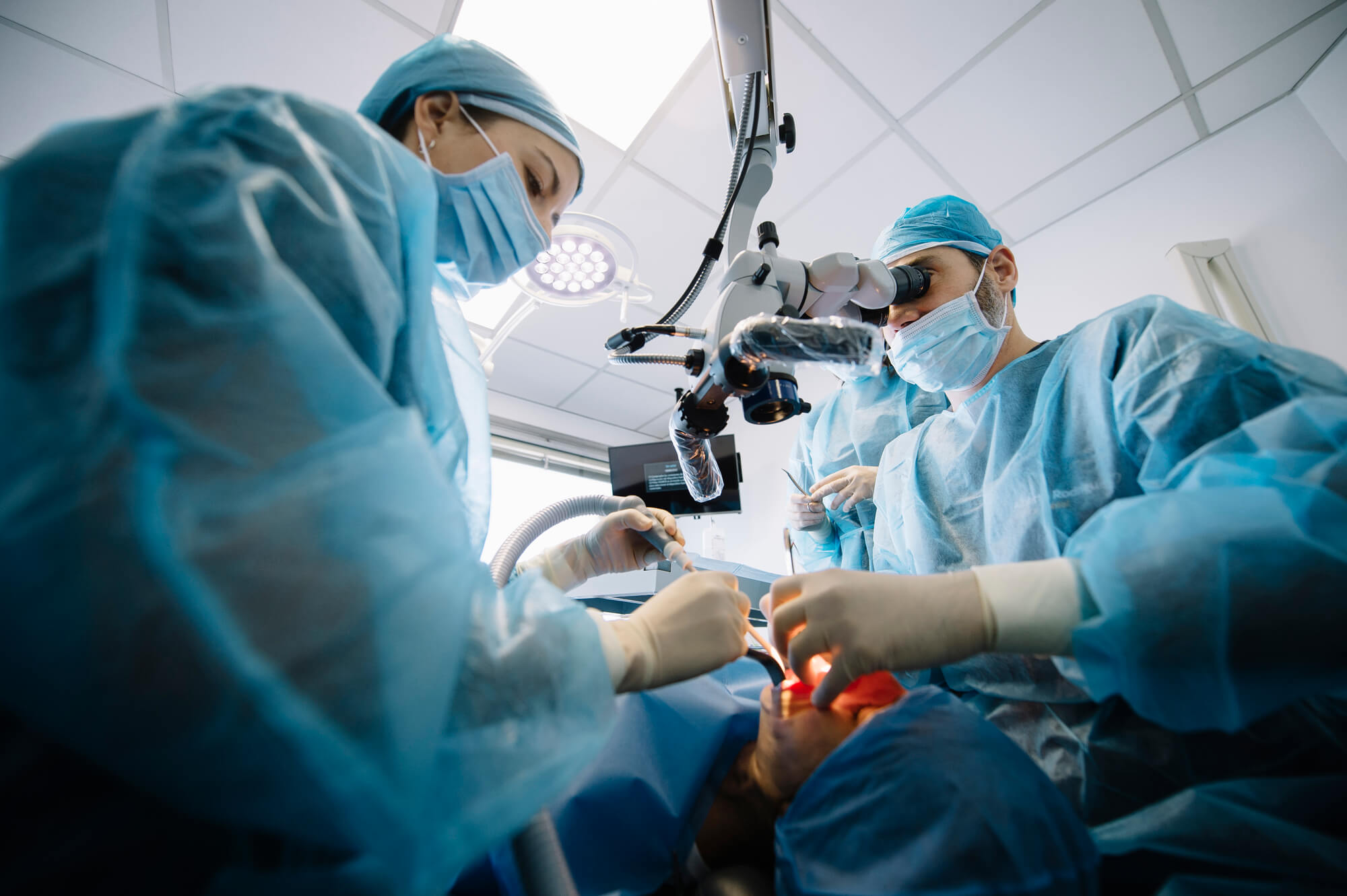Surgical tooth extractions are dental procedures that are necessary to keep your mouth healthy, even though some people may feel uneasy about them. These extractions are done to treat certain dental issues and prevent future problems.
Here we’ll tell you what you can expect during and after the procedure. Our goal is to help alleviate any concerns about undergoing Miami oral surgery and provide guidance for those considering this type of extraction.

What is a Surgical Tooth Extraction?
Surgical tooth extraction is a dental procedure used to remove teeth that cannot be easily accessed or extracted through a simple extraction. It involves making an incision in the gum tissue to access the tooth and, if necessary, removing a small portion of the bone surrounding the tooth.
Surgical extractions may be performed under local anesthesia, conscious sedation, or general anesthesia, depending on the complexity of the case and the patient’s preferences.
In Which Cases Are They Necessary
Surgical tooth extractions are necessary in specific cases where alternative treatments are not viable or effective. The following are common situations that may require Miami oral surgery.
Impacted Teeth
Surgical extraction is necessary when a tooth remains partially or completely trapped beneath the gum line. Impacted teeth can cause pain, infections, and damage to neighboring teeth. Removing the tooth becomes crucial to alleviate discomfort and prevent complications.
Severe Tooth Damage or Fractures
When a tooth is severely damaged due to extensive decay, trauma, or fractures that cannot be restored, surgical extraction is recommended. These teeth may be non-functional, cause persistent pain, or harbor recurrent infections. Removing the tooth surgically resolves the issue and prevents further problems.
Dental Infections
These extractions are necessary in cases of severe dental infections, such as abscesses, when root canal treatment is not feasible or unsuccessful. This approach eliminates the source of infection, prevents its spread to other areas, and promotes healing.
Crowded Teeth
In situations where there is limited space in the mouth, resulting in overcrowding of teeth and impeding proper alignment, it’s possible your dentist recommends surgery. Removing one or more teeth creates space, enabling the remaining teeth to align correctly during orthodontic treatment.
Wisdom Teeth
Surgical extraction of wisdom teeth is often necessary due to their frequent complications. Wisdom teeth can be impacted, meaning they do not fully erupt through the gum line. They may grow at an angle or in an improper position, causing pain, infections, and potential damage to neighboring teeth.
Preparation Before the Surgery
Before undergoing a surgical tooth extraction, several preparations are made to ensure a smooth and safe procedure. Two essential aspects of preparation are dental examination and determining the appropriate anesthesia options.
Dental Examination and X-rays
A thorough dental examination is conducted to evaluate the tooth to be extracted and the surrounding structures. This assessment helps the dentist or oral surgeon determine the complexity of the extraction and identify any potential complications.
X-rays, such as panoramic or periapical radiographs, may be taken to provide a detailed view of the tooth, roots, and nearby tissues. These images aid in treatment planning and help identify the best approach for the extraction.
Anesthesia Options
To ensure patient comfort during Miami oral surgery, different anesthesia options are available. The choice of anesthesia depends on the complexity of the case, patient preferences, and the dentist’s or oral surgeon’s recommendation. The three main types of anesthesia used in surgical extractions are:
- Local Anesthesia: This involves injecting an anesthetic agent, such as lidocaine, into the area surrounding the tooth to numb the extraction site. Local anesthesia ensures the patient does not feel pain during the procedure while remaining awake and aware.
- Conscious Sedation: Conscious sedation involves administering medications to induce a relaxed and drowsy state during the extraction. It helps reduce anxiety and discomfort. The patient remains conscious but may have limited memory of the procedure.
- General Anesthesia: This is typically reserved for complex cases or patients with specific medical conditions. It involves administering medications to induce a deep sleep, rendering the patient unconscious and unaware during the procedure. General anesthesia is administered by an anesthesiologist, ensuring the patient’s safety and comfort throughout the surgery.
The Surgical Tooth Extraction Procedure
Surgical tooth extraction involves several steps to safely and effectively remove the tooth.. Here is an overview of the procedure:
Administration of Anesthesia
Before the extraction, your oral surgeon will administer anesthesia to ensure a painless experience. The type of anesthesia used may vary depending on the complexity of the case and patient preference.
Incision and Access
Once the area is numb, the dentist or oral surgeon creates an incision in the gum tissue to expose the underlying tooth and bone. The size and location of the incision depend on the tooth being extracted and the accessibility required for the procedure.
Bone Removal (if necessary)
In some cases, the dentist or oral surgeon may need to remove a small portion of the bone surrounding the tooth to access and extract it properly. This step may be necessary when the tooth is impacted or if there are bony obstructions preventing straightforward extraction.
Tooth Extraction Techniques
After gaining access to the tooth, specialized instruments, such as elevators and forceps, are used to gently loosen the tooth from its socket. The dentist or oral surgeon applies controlled pressure to carefully detach the tooth’s ligaments and ease it out of the socket.
Closure of Incision
Once the tooth is successfully extracted, the incision in the gum tissue may be closed using dissolvable sutures. In some cases, the incision is left open to heal naturally, particularly if the extraction involved a large tooth or complex procedure.

Post-operative Care and Recovery
After Miami oral surgery, proper post-operative care is crucial to promote healing and minimize discomfort. Here are essential guidelines for post-operative care and recovery:
- Pain Management and Medications: Following the procedure, the dentist or oral surgeon may prescribe pain medications to help manage any discomfort. It is important to take the medications as directed and report any severe or prolonged pain to the dental professional.
- Bleeding Control: Some bleeding is normal after a surgical extraction. To control bleeding, gently bite down on a gauze pad placed over the extraction site. Replace the gauze as needed, and continue applying pressure until the bleeding subsides. Avoid vigorous rinsing or spitting, as this can dislodge blood clots and prolong bleeding.
- Oral Hygiene Practices: Good oral hygiene is crucial for proper healing after Miami oral surgery. However, it is important to avoid the extraction site while brushing and flossing for the first 24 hours after the procedure. After this initial period, gently rinse your mouth with warm saltwater several times a day to keep the area clean and promote healing. Be cautious not to disturb the extraction site.
- Diet Recommendations: Stick to a soft food diet for the first few days after the extraction. Avoid hot, spicy, and hard foods that can irritate the extraction site. Gradually reintroduce solid foods as you feel comfortable, taking care to chew on the opposite side of the extraction site.
- Avoid Smoking and Alcohol: Smoking delays the healing process and increases the risk of complications after oral surgery in Miami. It is crucial to refrain from smoking for at least 48 hours after the extraction. Additionally, avoid consuming alcoholic beverages during the recovery period, as they can interfere with the healing process and interact negatively with any prescribed medications.
Potential Complications
While surgical tooth extractions are generally safe, there can be potential complications that may arise during or after the procedure.
Bleeding
Some bleeding is normal after a tooth extraction. However, if the bleeding is excessive or does not subside after applying gentle pressure with gauze, it is important to seek immediate dental attention. The dentist or oral surgeon may need to take steps to control the bleeding, such as applying additional pressure, using hemostatic agents, or suturing the area.
Infection
Signs of infection include increased pain, swelling, fever, or foul odor. If you suspect an infection, contact your dental professional promptly. They may prescribe antibiotics to manage the infection and recommend additional measures, such as warm saltwater rinses, to promote healing.
Dry Socket
Dry socket is a condition that may occur when the blood clot at the extraction site becomes dislodged or dissolves too quickly. It can lead to severe pain and delay the healing process. If you experience intense pain that radiates to the ear or have a bad taste or odor in your mouth, contact your dental professional.
Nerve Injury
In rare cases, there is a risk of nerve injury during a surgical tooth extraction, especially with impacted wisdom teeth. Numbness, tingling, or altered sensation in the tongue, lips, or chin may indicate nerve damage. Contact your dental professional immediately, they will evaluate the situation and provide appropriate management or refer you to a specialist if necessary.
Sinus Complications
For upper molar extractions, there is a possibility of sinus complications if the extraction site is in close proximity to the sinus cavity. Symptoms may include pain, pressure, nasal congestion, or a runny nose. If you experience any of these symptoms, inform your dental professional. They will assess the situation and recommend appropriate measures, such as sinus precautions and medications if needed.

Do You Need Miami Oral Surgery?
Experience compassionate care and expert oral surgery at Dental American Group! If you’re in need of a surgical tooth extraction or any other dental procedure, our skilled team is here to help. Contact us today to schedule an appointment!

